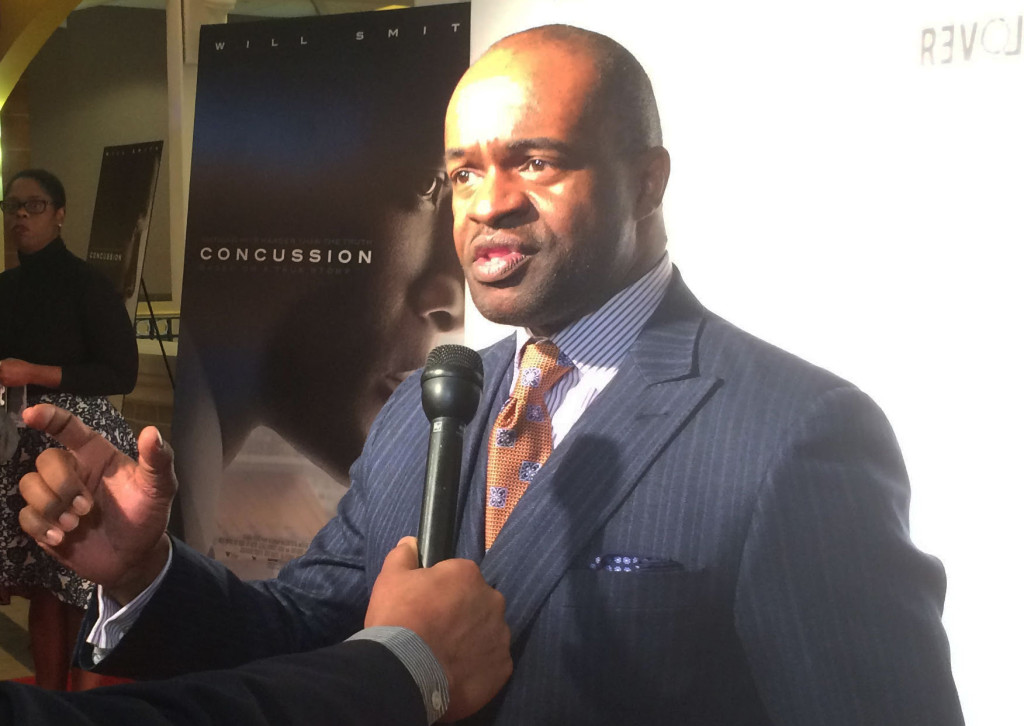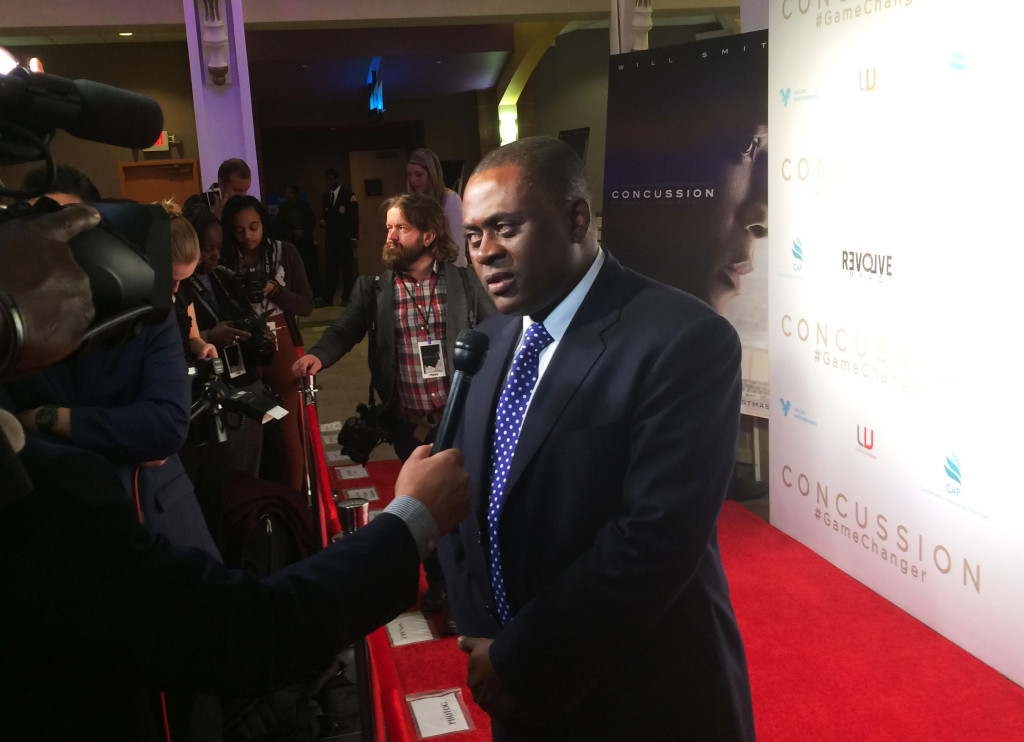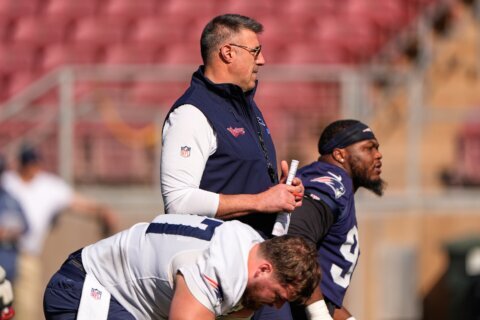WASHINGTON — Dr. Bennet Omalu seeks the truth. You could say it’s the defining principle of his entire life.
“If you do something in truth,” he will tell me, “You step out boldly into the light.”
Omalu’s work is the catalyst for everything that we have learned about concussions over the past dozen years. The film “Concussion,” which opens Christmas Day, is as much the story of his life and his search for truth than it is about chronic traumatic encephalopathy (CTE) and the effects it has on the human brains of NFL players.
He’s here at a premiere of the film in D.C. to speak with media and promote his story.
To my surprise, DeMaurice Smith, executive director of the NFL Players Association, is here as well.
I’m here because three months ago, the New York Times published a piece regarding a series of emails from the Sony leak revealing that certain elements of the film had been edited or omitted, pieces that the NFL might have objected to or even brought legal action against the studio for taking excessive use of creative license. The article cites a top Sony lawyer as having written that the studio took “most of the bite” out of the film.
When you watch “Concussion,” it’s difficult to imagine what punches might have been pulled. The film thoroughly depicts the spiraling descent of players into madness, culminating in their own suicides, many of which occur just off camera. The NFL is compared or linked by the film’s protagonists directly to the tobacco industry no fewer than three times. Ominous music fills the theater as the dark-suited NFL executives appear on screen.
The league is clearly positioned as the villain in all of this, the antagonist to Omalu and, therefore, to the truth. It’s all consistent with what was reported in League of Denial, the book by Mark Fainaru-Wada and Steve Fainaru. I want to know what Omalu knows, what more might have been left out, what truths lie on the cutting room floor of a Sony studio. Surely if any man wants the full truth revealed, if anyone would feel slighted by an incomplete story, it would be Omalu himself.
But first, there’s Smith.
“We all live in a world where if anybody tells a story, the first thing anybody will do is speak about what was left out,” he says.
Smith’s tenure atop the NFLPA has been defined largely by the slow reveal of the seriousness of concussions on long-term player health. And while the NFLPA has come under fire for its lack of player protections in other areas, as this Deadspin satire highlights, long-term player health and safety has been at the forefront of the fight since Smith took office.
“For the Players Association, it was literally the first thing I did as the executive director, was to show up at congressional hearing and be brutally honest about what the role of the NFL was in trying to block this research and the necessity of us moving forward to keep a group of employees safe,” Smith explains.
***

Just this year, CTE has been confirmed as a unique disease that can be definitively diagnosed, per the medical journal “Acta Neuropathologica.”
There is an important distinction here to be made between trying to prevent the kind of visible concussions we see every day, whether through improved technology or rule changes, and the type of sustained, repeated subconcussive hits that led to the discovery of CTE. The extent to which the latter impacts the brain, something not understood until Omalu literally cut former Pittsburgh Steeler Mike Webster’s open and examined it in 2002, is what is still often misunderstood in those who continue, in the overwhelming face of scientific evidence, to reject Omalu’s conclusions.
The war on football is real. Not sure source but concussion alarmists are loving it. Liberal media loves it. Doesn't matter. It's real.
— Danny Kanell (@dannykanell) December 8, 2015
It seems everyone is being accused of having an agenda in the concussion debate except Dr Olumu. He doesn't know everything.
— robert smith (@Robert26Smith) December 10, 2015
Omalu is an immigrant, born in Nigeria, who moved to the states in 1994. But he is as proud an American and a Christian as anyone you will find. This is of particular note in the current political climate, where former football players with a broadcast platform are raging back against medical progress in defense of their game, against someone they perceive as an outsider, someone who publicly advocated last week against allowing children to play football, based on his research.
But, of course, that’s the whole point. Omalu is the ultimate outsider, the one who had nothing to gain but knowledge and truth from his initial test on Webster and his entire decade plus of follow-up research and fights against the NFL. He’s fended off attacks on his credibility, even death threats.
“You cannot let fear drive your life,” he says. “It’s wrong. It is not of God to be afraid.”
When truth is your only objective, because you believe truth to be the closest thing Godliness, the only thing worth risking everything for, there is no room for other agendas.
“If it’s clearly seen that what you do is being done in love, what is there to be afraid of?” Omalu asks.
The only one that’s been afraid is the league, which stands to potentially suffer greatly from a severe drop-off in enrollment in Pop Warner leagues and high school teams. The film itself predicts potentially catastrophic results from as little as a 10 percent decline in youth participation. The sport has already seen a 2.5 percent drop since 2008-09.
***

“The core history of this is you had a doctor that made a revolutionary discovery,” says Smith. “And the reality is the league did employ virtually all its resources to prevent that discovery from either being published or legitimized.”
All of this is front and center in the film. So was anything else vital left out? Was the story polished to cover even further evils perpetrated by the league? If anyone would know and would be willing to say so, it would be Omalu, the champion of truth, of his own story of becoming an American.
So, Dr. Omalu, what of the report that the movie was softened at the behest of the NFL?
“That is not true, that is inaccurate,” he says, his bloodshot eyes dropping momentarily from their fixed gaze. He seems genuinely disappointed, as if the question is an accusation of his own legitimacy (rather than that of the filmmaker’s), which has been questioned ever since he made his findings public.
He looks tired, but he maintains his intensity, one that may seem over-the-top in how Will Smith portrays it, but that I can tell you that he, if anything, underacted. He stands close, almost uncomfortably so, grasping me by the shoulders as he implores to me the truth, his truth.
“There are certain things you take out,” Omalu explains of condensing 12 years of history into a two-hour film. “But not because we were afraid of anybody. Remember, in this journey, I’ve never been afraid.
“It is not American to be afraid.”






